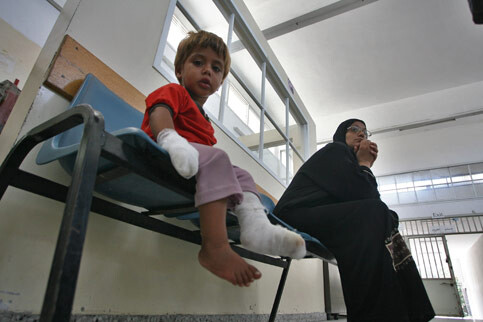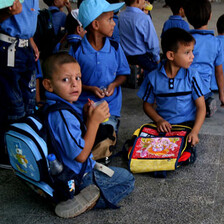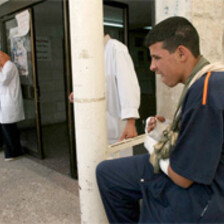The Electronic Intifada 2 September 2008

Palestinian patients wait for treatment at the Shifa hospital in Gaza City after a large numbers of doctors and other health workers went on strike, 31 August. (Wissam Nassar/MaanImages)
RAMALLAH/GAZA (IRIN) - Strikes in state schools and the health sector are plaguing the Gaza Strip, causing turmoil and reminding all that the rival Fatah and Hamas factions in Gaza are still far from working out their differences.
According to international observers, the strikes at hospitals in Gaza, which started on 30 August, led to a significant section of the medical workforce staying away.
At the main Shifa hospital and several of the larger medical institutions, some 30 percent of doctors and 70 percent of nurses absconded, although at some smaller hospitals in the north and south the impact was not as deep.
An official at the International Committee of the Red Cross said services were mainly limited to emergency needs, and a local observer said standard medical checks and procedures were hardly being carried out.
Hamas spokesman Fawzi Barhoum, speaking with IRIN, blamed the strikes on the Ramallah-based caretaker government of Prime Minister Salam Fayyad and President Mahmoud Abbas.
“These are political strikes [dictated by] Fatah in Ramallah to spoil Palestinian life in Gaza by attacking the health and education sectors,” he said, calling the labor actions “unfortunate.”
Barhoum said the move would only make reconciliation between the opposing parties more difficult.
Gaza’s Islamist government quickly replaced striking teachers with other workers.
The strikers had heeded the strike call by the Fatah-allied United Federation of Teachers to protest against what it said were politically motivated manpower policy decisions by Hamas.
Some residents have complained, saying the 2,000 new teachers and assistants in Gaza’s schools are not sufficiently experienced to take over the classrooms, while others accepted the decision, noting that without replacing the missing teachers the school year, which has just started, would be badly interrupted.
It remained unclear how the changes would affect international aid programs in schools.
Threat by PA?
Adding to the complications, the Palestinian Authority (PA), the government in Ramallah, which pays salaries to many civil servants in Gaza, was rumored to have threatened to cut off teachers who did not strike, placing them in a difficult position: no matter what they did would lead them to getting into trouble with one group or the other.
While the PA has privately denied the charges, it has not put out a statement to clarify its position.
With unemployment in the enclave rife, losing a job or a pension is a major concern.
One father of school-aged children in Gaza said the entire situation was “political and shameful.”
A senior UN political official told IRIN he was concerned by the “transfers and replacements” by Hamas of health and teaching professionals and the subsequent strikes called by unions, which he said “threaten the provision of health and education services to the people of Gaza who already face considerable hardship.”
In various reports released by local and international rights groups both the Ramallah government and the de facto rulers of Gaza have been accused of politically motivated attacks and arrests in the areas under their respective control.
The Islamist Hamas movement took over Gaza in 2007, ousting security forces loyal to the more secular Fatah, leaving the enclave under tight sanctions and the occupied Palestinian territory divided, under dual regimes.
This item comes to you via IRIN, a UN humanitarian news and information service, but may not necessarily reflect the views of the United Nations or its agencies. All IRIN material may be reposted or reprinted free-of-charge; refer to the copyright page for conditions of use. IRIN is a project of the UN Office for the Coordination of Humanitarian Affairs.
Related Links

